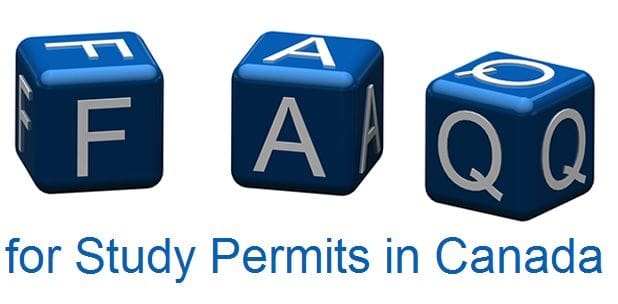FAQs for Study Permits in Canada
FAQ – Canadian Study Permits
In this article, I will address a few popular questions and answers for study permits in Canada and some important information to consider if you are applying for a study permit. A study permit is intended for foreign nationals who would like to come to Canada to pursue an education. It was intended to provide foreign nationals with an opportunity to further their education and careers through a Canadian educational institution. If you feel as though you would be eligible to apply for a study permit, I suggest you read our article on “Study Permit Eligibility” before reading this question and answer article. The intention of this article is meant to clarify any misunderstanding or confusion with regards to study permits in Canada.
Q: If I were to come to Canada to study, what would be the best university to go to?
A: It is beneficial to look at Macleans magazine as they rank the top universitites in Canada annually. They also separate the top universities based on the top comprehensive universities and the top Medical Doctoral universities in Canada. The difference between a comprehensive university and a Medical Doctoral university is quite noteworthy. A comprehensive university offers a significant degree of research and a variety of programs at both the undergraduate level and the graduate level, which includes professional degrees. In contrast, the Medical Doctoral university offers a diverse selection of Ph.D programs, which includes medical schools. Below is a chart for the top 10 Comprehensive universities and Medical Doctoral universities in Canada for the year of 2016.
| Comprehensive Universities | Medical Doctoral Universities |
| 1. Simon Fraser | 1. McGill |
| 2. Waterloo | 2. Toronto |
| 3. Victoria | 3. UBC |
| 4. Guelph | 4. Queen’s |
| 5. Carleton | 5. Alberta |
| 6. New Brunswick | 6. McMaster |
| 7. Memorial* | 7. Dalhousie |
| 8. York* | 8. Ottawa* |
| 9. Wilfred Laurier* | 9. Western* |
| 10. Concordia* | 10. Calgary |
Please note that * indicates a tie between the universities.
Q: Is there any important information that I should know about schools and universities in Canada?
A: Canada is known as a progressive country that offers exceptional educational opportunities for foreign nationals from all over the world. The schools and universities in Canada are recognized for being of high caliber. Additionally, the tuition fees in Canada are much less compared to American educational institutions for international students. It is very important to note that with a Canadian educational credential, the chances of obtaining permanent residency in Canada are quite high as there are many different programs international students can apply for after graduation. I will explain in detail the different educational institutions available in Canada below.
Elementary School & High School (Primary & Secondary)
In Canada, education is regulated provincially, therefore the admission requirements differ based on the school and where it is located. For any dependent children of a parent who is currently authorized to either study or work in Canada does not need to apply for a study permit to attend elementary school or high school in Canada. However, the dependent child of a parent who is not eligible to study or work in Canada needs to apply for a study permit from their country of residence.
Colleges & Universities
After successfully completing high school (secondary), there are a variety of options available for post-secondary education for students within Canada. In Canada, there are 98 universities to choose from and there are approximately over 150 colleges to choose from. The highest concentration of universities and colleges are in Quebec, Canada. Keep in mind, each university and college has their own eligibility and entrance requirements. The requirements can include different levels of English or French proficiency depending on where in Canada you plan on studying.
Private Schools & Vocational Programs
Canada offers a wide selection of private schools that provide programs in a variety of different fields of study. Similar to colleges and universities, these private institutions also have eligibility and entrance requirements depending on each school. Each of these private institutions have the authority to establish their own entrance requirements and fees compared to public institutions. Prior to attending one of these private schools, it is very important to verify that the school is accredited in the province that it is located.
Language Training Schools
There are many educational institutions in Canada that specialize in teaching English and French to foreign students as these are Canada’s official languages. It is important to note that most of these language training schools are not regulated by the provincial government. Therefore, it is essential for you to ensure that the school is accredited in the province that it is located.
Q: How Can I Study in Canada?
A: Although this may be a general question, I will explain how to go about studying in Canada. First and foremost, before you can study in Canada, you will need to acquire a valid study permit. Of course, this depends on what type of course or program you plan on studying, as there are exceptions. In order to get the valid study permit, you will need to get an acceptance letter from an educational institution listed on the designated learning institutions list. In order to get an acceptance letter, it is advisable to apply to a few educational institutions to see who will accept you. Once you receive your acceptance letter from the designated learning institution, then you may proceed to apply for a study permit in Canada. For steps on how to apply for a study permit, please refer to our article on “Study Permit Eligibility.”
Contact Akrami & Associates
Should you have any further questions or feel confused or unclear about how to apply for a study permit, it is important to talk about any questions you may have and discuss your concerns. By talking to immigration professionals about your concerns, this will ease your worries and assist with the application process. Many immigration applications are difficult to pursue on your own and it is highly recommended that you seek out professional and experienced help before attempting to apply. Here, at Akrami & Associates, we work and have experience with many different immigration issues. We have helped many of our clients obtain a valid study permit and they are now happily enjoying their visit in Canada while studying at a Canadian educational institution. If you believe that you may be eligible for a study permit, please feel free to contact Akrami & Associates at our office at 416-477-2545 for more information or if you would like to book a consultation with an immigration professional for more advise.
With Akrami & Associates, there is always a way!
Latest Immigrations News

December 5, 2025
THE ULTIMATE GUIDE TO HUMANITARIAN & COMPASSIONATE (H&C) APPLICATIONS IN CANADA
THE ULTIMATE GUIDE TO HUMANITARIAN & COMPASSIONATE (H&C) APPLICATIONS IN CANADA Understanding When, Why, and How to Apply for Permanent Residence on Humanitarian Grounds What Is an H&C Application? A Humanitarian and Compassionate (H&C) application is a last-resort pathway for individuals who are in Canada and do not [...]

September 11, 2025
Canada Super Visa: Step-by-Step Guide for Parents and Grandparents
For many Canadian citizens and permanent residents, bringing parents or grandparents to Canada for extended visits is more than just a wish, it’s a heartfelt need. While most people first consider the traditional visitor visa, there is another option designed specifically for family reunification: Super Visa applications. [...]

August 23, 2025
Intra-Company Transfer (ICT) Work Permit, Your Complete Guide to Working in Canada
For multinational companies, moving key talent across borders is often essential for growth and operational success. The Intra-Company Transfer (ICT) Work Permit provides a streamlined pathway to bring experienced employees to Canada without the time-consuming Labour Market Impact Assessment (LMIA) process. For foreign professionals, it’s more than [...]

Book a Conslutation
One of our Representatives will
assist you with your matter. Book Now!
Click here

Call us for
more Information
+1-416-477-2545
Toll Free: 1-877-820-7121
Click here

Write Us (Online Form)
Complete our form and one of our
Representatives will contact you.
Click here
Subscribe To Our Newsletter





